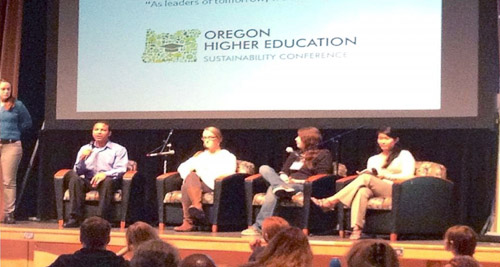Turning over a green leaf isn’t always easy, but it’s something that Portland State does over and over again, year after year. Our school is constantly looking for new ways to be more eco-friendly, as well as revitalizing old methods to stay current with the technology of the day.
All green on the southwestern front

Turning over a green leaf isn’t always easy, but it’s something that Portland State does over and over again, year after year. Our school is constantly looking for new ways to be more eco-friendly, as well as revitalizing old methods to stay current with the technology of the day.
Earlier this month, PSU hosted the first-ever Oregon Higher Education Sustainability Conference. Almost 400 administrators, professors, activists and eco-thinking industry workers gathered to explore ways to lessen our impact on the world while still meeting the demands of a developed society.
This conference was, in some ways, an extension of PSU’s ReTHINK campaign. The ReTHINK campaign operates on a universal definition of sustainability (rather than looking at it as just an environmental issue) and applies it to education. In doing so, the campaign helps build credit options for internships, create online degrees and develop other ideas pertaining to education and career-building. The best part about ReTHINK is that it asks students and staff to get directly involved, thus building a community throughout PSU.
After Feb. 22, ideas submitted to ReTHINK will go under review. Finalists will be announced in March, and grants will be made in April. As students of PSU, we’ve been asked to be a part of the decision-making process by leaving feedback on all of the possible concepts. Go to rethink.pdx.edu to give your input.
Both the OHESC and ReTHINK make it clear that if we’re to confront climate change and prepare students for a greener future, community involvement and awareness is key. Keynote speaker David Kenney said: “We’re trying to find new ways to provide the basics people need. Other countries are doing a better job at implementing clean tech solutions, but the U.S. still leads in innovation and invention.”
Kenney added that U.S. universities are unparalleled in research and entrepreneurship pertaining to sustainability. There is some truth to Kenney’s statement, but that shouldn’t deter us from constantly aiming to improve our sustainability efforts.
Student involvement is key to improving sustainability. During the conference, Erin Flynn, associate vice president for strategic partnerships at PSU, stated that the university is “strong in environmental sustainability curriculum,” but the coursework provided “does not prepare students with specific knowledge and skills needed to enter the green energy industry.”
To counter that, student activity was a main part of the OHESC. The conference included many student-led workshops and also provided an outlet for attendees to craft their own “sustainability vision and action plan.”
Some of the documented ideas and action plans included finalizing a plan for zero campus waste that will be accomplished by 2025, developing “a requirement in each major that addresses the intersection of sustainability and the field of study,” and mandating programs that will “provide a holistic introduction to sustainability for first year students, new staff, faculty and administrators, which address oppression of both people and the planet.”
All these ideas have been compiled into a manifesto of sorts and are available online at pdx.edu.
As students and staff of PSU, sustainability is something that we should all get behind. The world’s population has doubled in the last 50 years alone, so finding green ways to support this ever-expanding community is doubly important. However, this can’t all be done in the blink of an eye. Building a sustainable community and future requires participation and time. Lucky for us, we have the privilege of attending an institution—as well as living in a city—that values this.
When it comes down to it, we don’t really have a choice about whether we should care about sustainability, because in some way, shape or form, we’re all impacted by these decisions. With that in mind, we might as well work together to make first our school, then our city and then our world a greener place.




